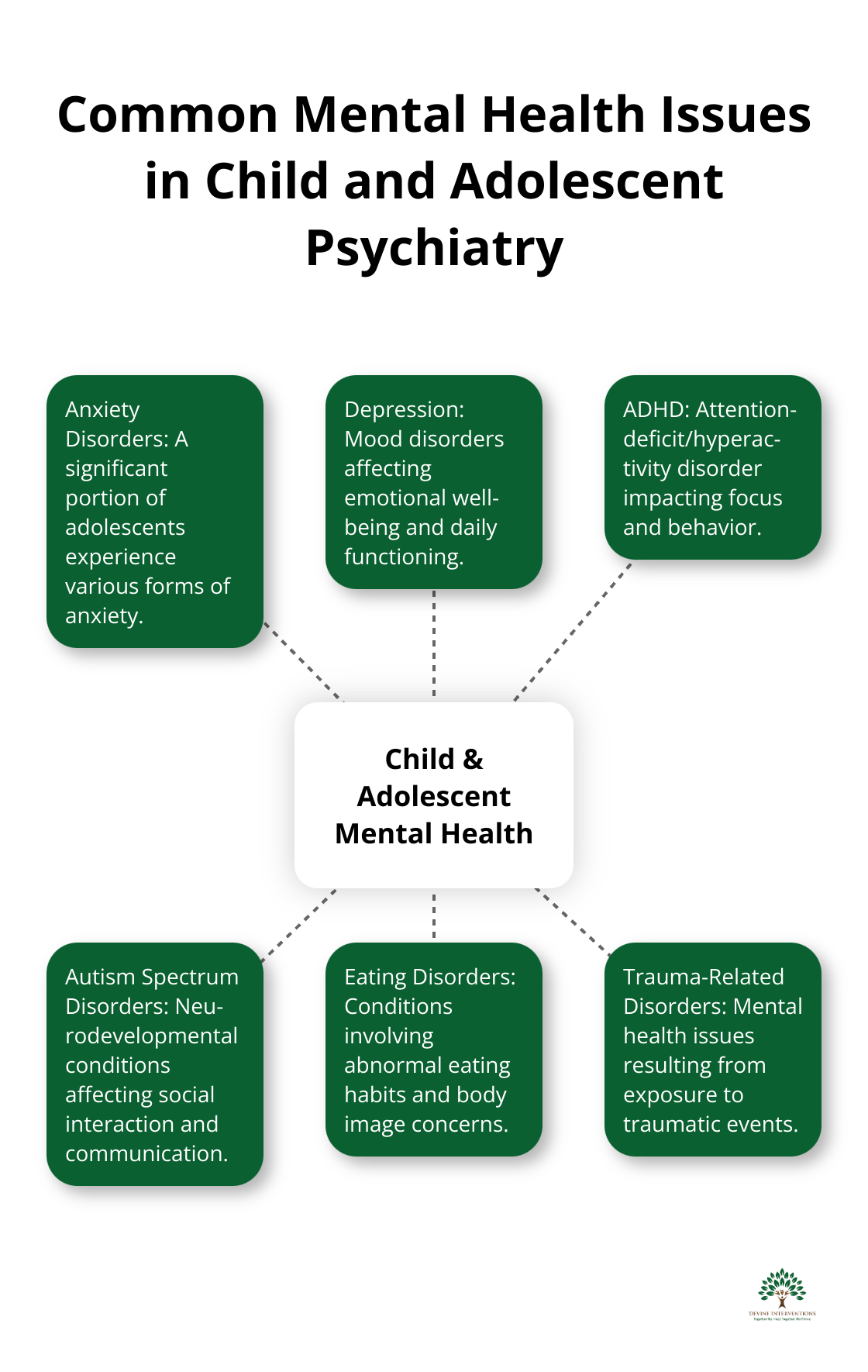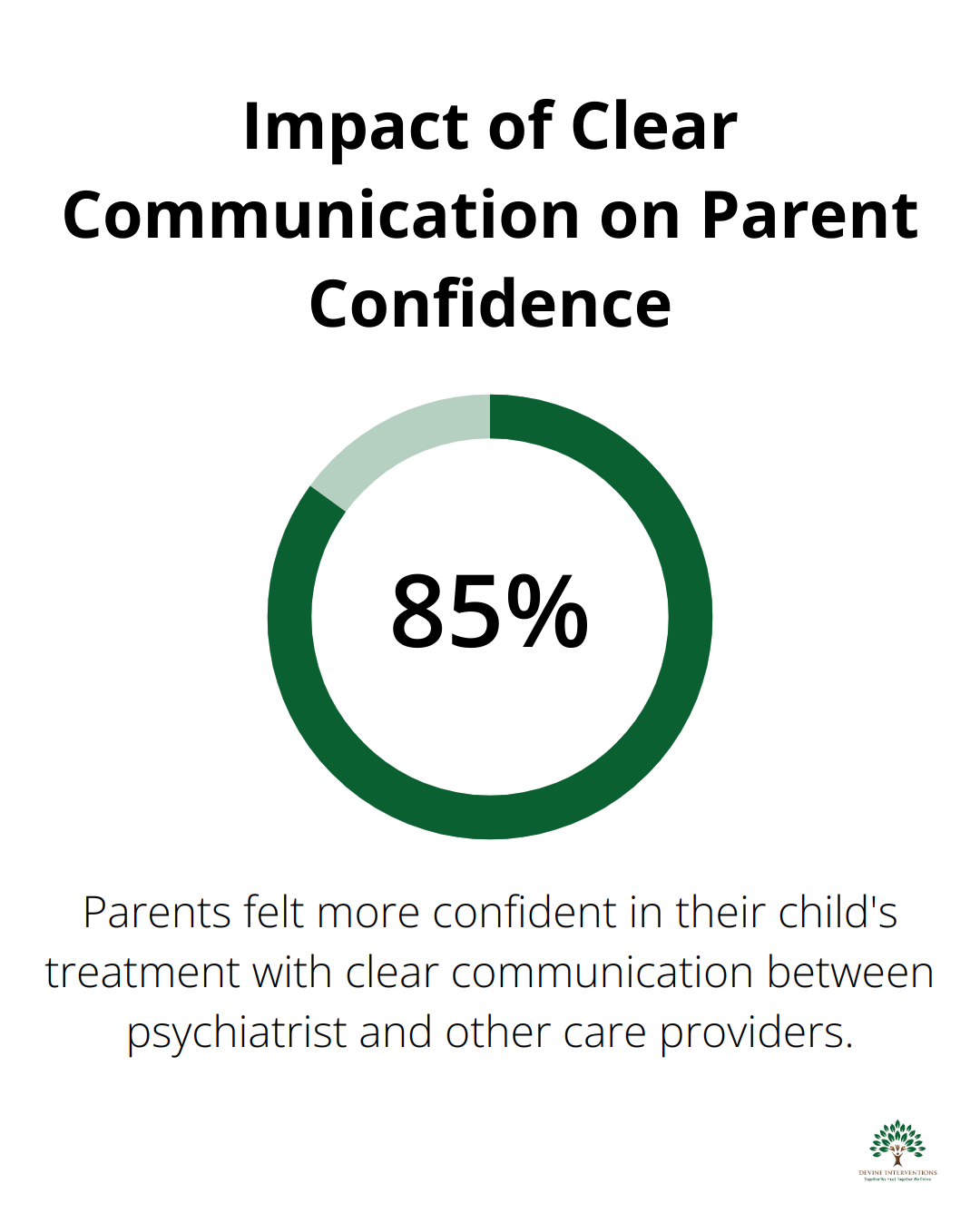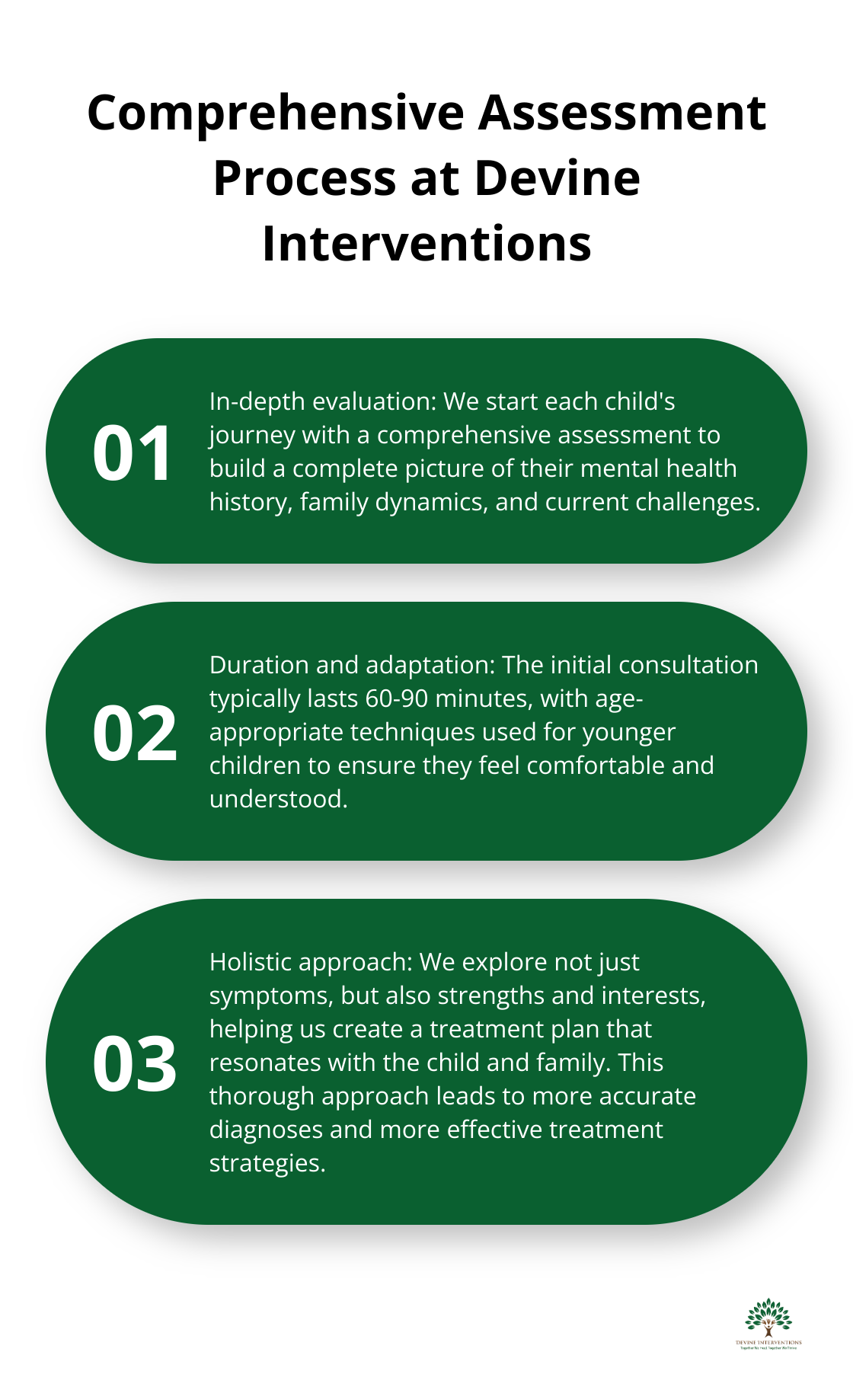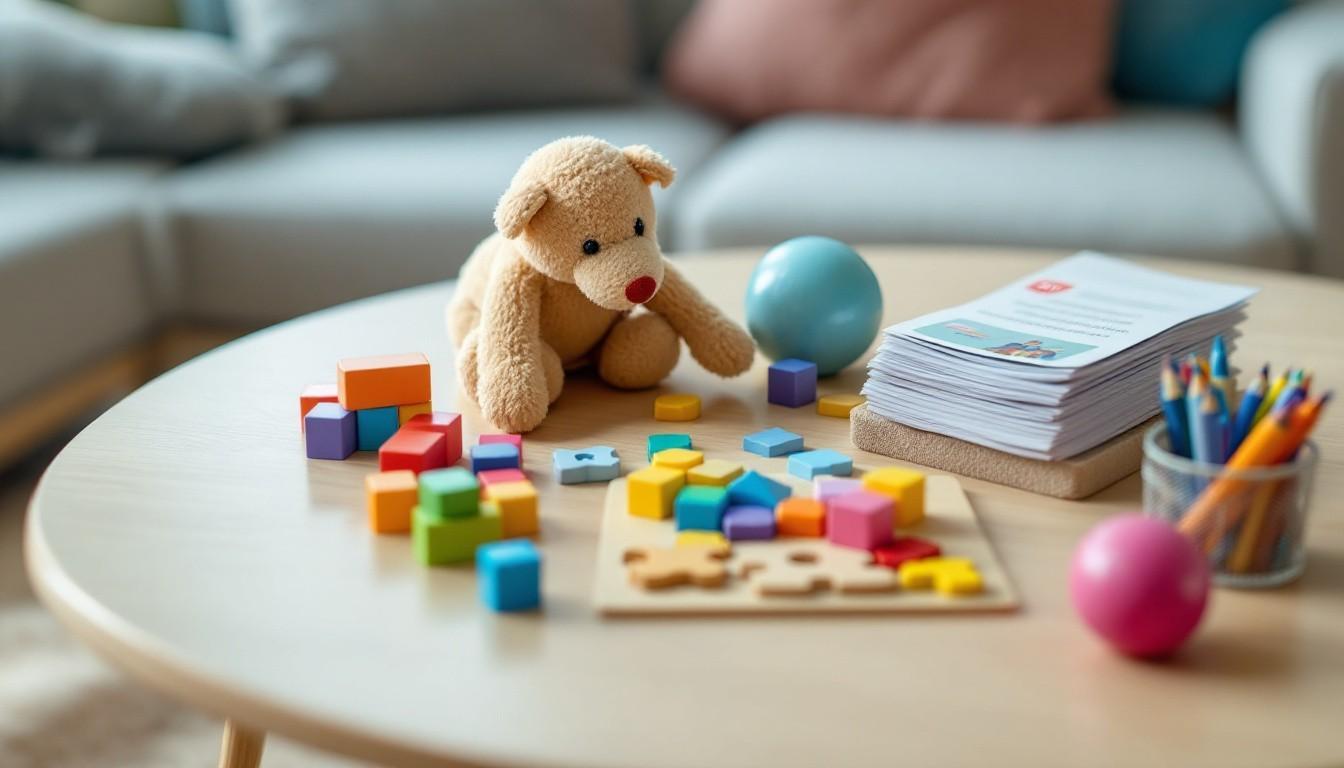At Devine Interventions, we understand the challenges families face when dealing with child and adolescent mental health issues.
Child and adolescent psychiatry plays a vital role in addressing these concerns, offering specialized care for young minds.
Early intervention and professional support can make a significant difference in a child’s life, setting the foundation for a healthier future.
What is Child and Adolescent Psychiatry?
Child and adolescent psychiatry is a specialized field of medicine that focuses on diagnosing and treating mental health issues in young people. This specialized care can transform lives.
The Scope of Child and Adolescent Psychiatry
Psychiatrists work with children and teens facing a range of mental health challenges. These include anxiety disorders, which affect a significant portion of adolescents. Treatment also covers depression, ADHD, autism spectrum disorders, and eating disorders, among others.

One key aspect of this work is early identification. Mental health professionals train to spot signs of mental health issues in children as young as toddlers. This allows for intervention before problems escalate.
Common Mental Health Issues Addressed
Anxiety and depression are increasingly common among young people.
There’s also been a rise in trauma-related disorders.
The Importance of Early Intervention
Early intervention strategies can prevent mental health issues from becoming lifelong struggles. This fact underscores the critical nature of child and adolescent psychiatry.
Evidence-based treatments tailored to each child’s needs form the cornerstone of effective care. This might include cognitive-behavioral therapy, which has shown great success in treating anxiety and depression in young people.
Family involvement in the treatment process is also crucial. This approach helps create a supportive environment for the child beyond the therapist’s office.
The Role of Specialized Care
Specialized care in child and adolescent psychiatry offers targeted interventions that address the unique needs of young minds. These interventions (which may include play therapy, family therapy, and medication management) can significantly improve a child’s quality of life and future prospects.
The field continues to evolve, with new research and techniques emerging regularly. This progress ensures that children and adolescents receive the most up-to-date and effective care possible.
As we move forward, it’s important to consider how psychiatric professionals contribute to this vital field. Their expertise and approach can make all the difference in a young person’s mental health journey.
How Psychiatric Professionals Support Child and Adolescent Mental Health
Specialized Training and Expertise
Child psychiatrists undergo extensive training to understand the unique needs of young patients. This includes a medical degree, followed by a residency in general psychiatry, and then a fellowship in child and adolescent psychiatry. This rigorous education equips them to diagnose and treat a wide range of mental health conditions in young people.
A study published in the Journal of the American Academy of Child & Adolescent Psychiatry found that specialized training in child psychiatry led to more accurate diagnoses and more effective treatment plans for young patients.
Collaborative Care Approach
A team-based approach to mental health care yields the best results. Child psychiatrists work closely with families, schools, and other healthcare providers to create a comprehensive support system for the child.
This collaborative approach often includes:
- Regular meetings with parents to discuss progress and concerns
- Coordination with school counselors to address academic and social challenges
- Consultation with pediatricians to ensure holistic care
A recent survey by the American Psychiatric Association showed that 85% of parents felt more confident in their child’s treatment when there was clear communication between their psychiatrist and other care providers.

Evidence-Based Treatment Methods
Child psychiatrists use a variety of evidence-based treatments tailored to each child’s specific needs. These may include:
- Cognitive Behavioral Therapy (CBT): Helps children identify and change negative thought patterns
- Play Therapy: Allows younger children to express themselves through play
- Family Therapy: Addresses family dynamics that may contribute to the child’s mental health issues
- Medication Management: When necessary, carefully prescribed and monitored medication can be an effective part of treatment
Research published in the Journal of Clinical Child & Adolescent Psychology has shown that combining these evidence-based treatments can lead to significant improvements in children’s mental health outcomes.
Personalized Care Plans
Every child is unique, and their treatment should reflect that. Psychiatric professionals create individualized care plans that take into account the child’s specific needs, strengths, and challenges. These plans (which are regularly reviewed and adjusted) ensure that each child receives the most effective treatment possible.
Ongoing Support and Monitoring
Treatment doesn’t end when a child leaves the psychiatrist’s office. Psychiatric professionals provide ongoing support and monitoring to track progress and make necessary adjustments to the treatment plan. This continuous care helps ensure long-term success and prevents relapse.
The field of child and adolescent psychiatry continues to evolve, with new research and techniques emerging regularly. This progress ensures that children and adolescents receive the most up-to-date and effective care possible. As we explore the next chapter, we’ll take a closer look at how these principles are put into practice in our approach to child and adolescent psychiatric care.
How We Tailor Care for Young Minds at Devine Interventions
Comprehensive Assessment Process
At Devine Interventions, we start each child’s journey with an in-depth evaluation. This process typically lasts 60-90 minutes, allowing us to build a complete picture of the child’s mental health history, family dynamics, and current challenges. We adapt our approach for younger children, using age-appropriate techniques to ensure they feel comfortable and understood.
During this initial consultation, we explore not just symptoms, but also strengths and interests. This holistic view helps us create a treatment plan that resonates with the child and family. Our thorough approach leads to more accurate diagnoses and more effective treatment strategies.

Personalized Treatment Plans
We recognize that each child is unique, as are their mental health needs. That’s why we create individualized treatment plans for every young patient. These detailed, written documents are developed to address a person’s specific behavioral health needs. We develop these plans collaboratively with the child (when appropriate) and their family, ensuring everyone agrees with the proposed course of action.
Our treatment plans often include a mix of therapy, potential medication management, and holistic interventions. For example, we might recommend cognitive behavioral therapy (CBT) for a child struggling with anxiety, while another child might benefit more from play therapy. Flexibility and responsiveness to each child’s unique situation are key to our approach.
Family-Centered Approach
We firmly believe in the power of family involvement in the treatment process. Parents and caregivers are essential allies in a child’s mental health journey. We provide regular updates and involve families in therapy sessions when appropriate.
Our approach extends beyond the child to support the entire family unit. We offer guidance on creating a supportive home environment and provide resources for parents to better understand and respond to their child’s mental health needs. This family-centered approach has shown to significantly improve treatment outcomes and maintain progress long-term.
Integrated Care Model
At Devine Interventions, we employ an integrated care model that addresses all aspects of a child’s well-being. This approach combines mental health treatment with considerations for physical health, social factors, and academic performance. We collaborate with schools, pediatricians, and other healthcare providers to ensure comprehensive care.
Our integrated model allows us to address complex issues that may contribute to a child’s mental health challenges. For instance, we might work with a child’s school to implement accommodations that support their treatment goals (while maintaining confidentiality).
Ongoing Support and Monitoring
We provide continuous support and monitoring to track progress and make necessary adjustments to the treatment plan. This ongoing care helps ensure long-term success and prevents relapse. We schedule regular check-ins (typically 30-minute individual sessions) and offer flexible scheduling to accommodate families’ needs.
Our commitment to providing comprehensive, compassionate care for children and adolescents facing mental health challenges is unwavering. Our tailored approach, combined with our team’s expertise, creates a supportive environment where young minds can heal and thrive.
Final Thoughts
Child and adolescent psychiatry offers a path of hope and healing for young minds. At Devine Interventions, we witness how professional psychiatric care transforms lives through our comprehensive approach. Our evidence-based treatments and compassionate support address the unique needs of each child and family.
Mental health issues are common and treatable. With the right support, children and adolescents develop resilience, coping skills, and a positive outlook that serve them well throughout their lives. Our team of experienced professionals provides personalized care that considers every aspect of a child’s well-being.
We encourage you to reach out if you have concerns about your child’s mental health. Devine Interventions offers a range of services tailored to meet the needs of children, adolescents, and their families (including assessments, therapy, and medication management). Take the first step towards healing today and help your child reach their full potential.







